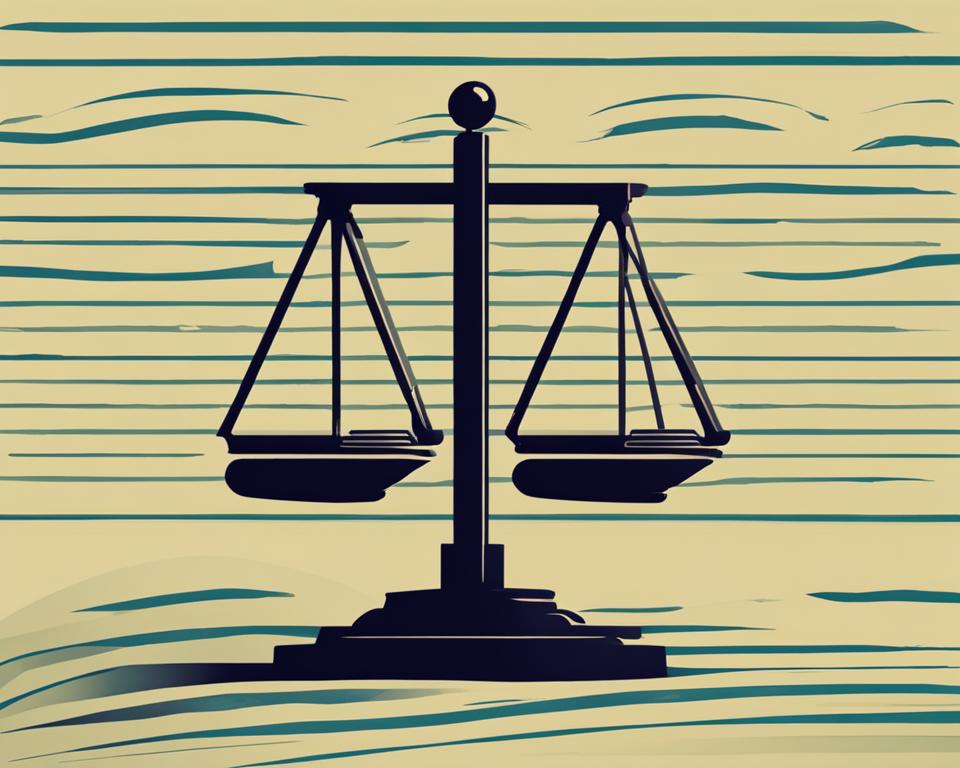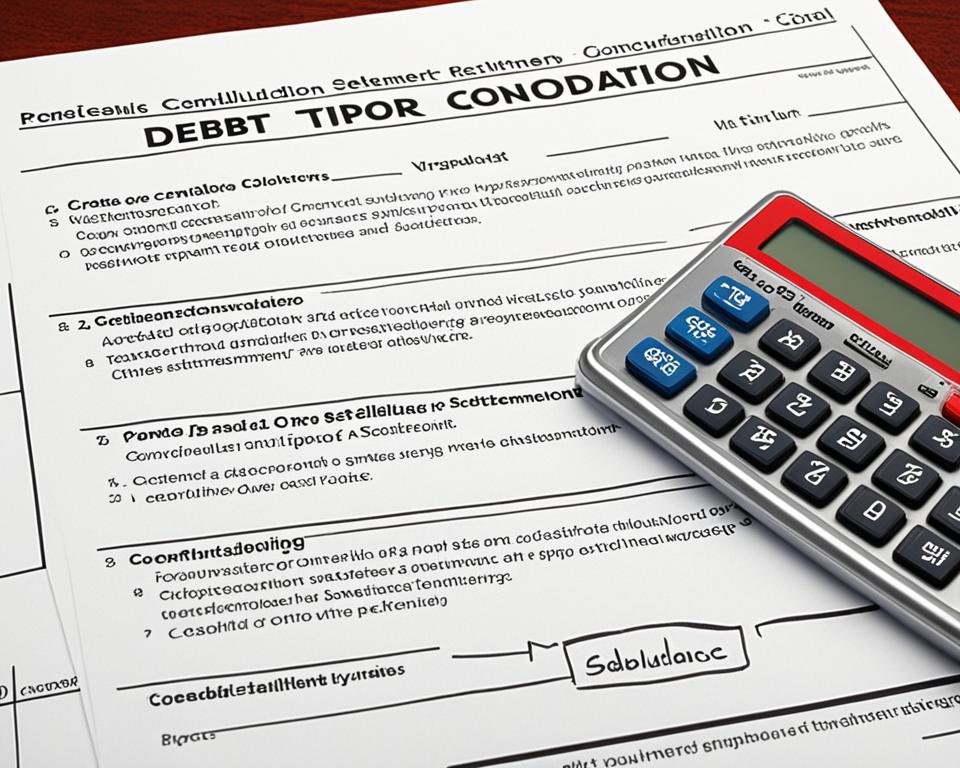When grappling with financial stress, discerning effective debt relief options is paramount. The debate between debt consolidation vs. debt settlement often emerges as a critical decision point for those seeking a path to financial freedom. These two strategies cater to different needs and have distinct impacts on one’s fiscal health. By better understanding and comparing these debt solutions, individuals can choose the path that aligns best with their unique financial situations and long-term goals.
To compare debt solutions effectively, one must consider personal financial factors, such as total debt, interest rates, and credit scores. Debt consolidation merges multiple debts into a single, often lower-interest loan, simplifying the repayment process. On the other hand, debt settlement aims to negotiate with creditors to reduce the debt amount owed—a tactic that can provide immediate relief but may have long-term credit implications.
Key Takeaways
- Debt consolidation combines various debts into one streamlined payment.
- Debt settlement negotiates to lower the total amount of debt owed.
- Both strategies offer potential benefits and risks, with varied impacts on credit scores.
- Choosing the proper method requires careful evaluation of an individual’s financial situation.
- Understanding the nuances between consolidation and settlement options is crucial for decision-making.
Understanding Debt Consolidation
When financial strains make themselves known, one commonly endorsed strategy is debt consolidation. It represents a smoother path for individuals juggling various high-interest debts and seeking a more manageable financial state. Let’s delve into the rationale behind this approach, its inherent advantages, and the mechanics of how it functions.
What Constitutes Debt Consolidation
At its essence, debt consolidation entails the amalgamation of multiple debts—a process electively chosen to transform numerous bills with varying due dates and interest rates into a single, streamlined monthly payment. Leveraging this financial tool could potentially lead to reduced interest rates and a harmonized repayment plan, thus offering the debtor a clear horizon for achieving debt freedom.
Benefits of Debt Consolidation
- A unified payment structure, simplifying personal financial management
- Potentially lower interest rates, resulting in cost savings over time
- A defined timeline for debt repayment, enhancing fiscal predictability
- Positive implications for credit scores, as debt consolidation can reduce credit utilization ratios
- Psychological relief from reducing multiple creditors to one
How Debt Consolidation Loans Work
By opting for a debt consolidation loan, individuals aver to a singular lending institution that effectively wipes clean a collection of unsecured debts, thereby encapsulating them into one loan with a fixed interest rate. This transaction often includes a direct payment to creditors from the debt consolidation company, allowing for a more direct and efficient handling of outstanding liabilities. Various financial instruments, such as balance transfer credit cards and personal loans, cater to the diverse needs and qualifications of debtors.
Below is a depiction of the types of tools commonly used in debt consolidation:
| Type of Consolidation Tool | Typical Features | Suitable for |
|---|---|---|
| Balance Transfer Credit Card | Low introductory APR, transfer fees | Consumers with excellent credit scores |
| Home Equity Loan | Fixed interest rates, secured by property | Homeowners with substantial equity |
| Personal Loan | Fixed terms, no collateral required | Individuals with good credit, steady income |
This array of consolidation tools presents different debt consolidation benefits and requirements, calling for a thoughtful evaluation by the individual to ensure alignment with their unique financial circumstances.
Exploring Debt Settlement
When individuals find themselves wrestling with the burden of substantial debt, the appeal of a reduced payoff through debt settlement looms large. Seeking to right one’s financial ship through debt settlement involves a nuanced process and an array of potential consequences.
The Process of Debt Settlement
The debt settlement process typically entails enlisting a debt settlement agency to act on your behalf in negotiating with creditors. These specialized agencies aim to convince creditors to accept a lump sum payment that is less than the full amount owed, potentially lightening the financial load of the indebted party.
Risks Associated with Debt Settlement
While debt settlement may seem like a beacon of hope, it’s crucial to navigate these waters with awareness of the attendant debt settlement risks. One often underestimated risk involves the accrual of further interest and fees during the negotiation phase, which can extend for months or years. Additionally, the potential tax implications on forgiven debt could leave an unwelcome surprise during tax season.
- Accumulation of late fees and penalties
- Increased interest rates on outstanding balances
- Possible legal action from creditors
- Debt relief scams and unethical agencies
Impact of Debt Settlement on Your Credit Score
One of the most significant repercussions of debt settlement is its impact on your credit score. Given that settled debts are reported distinctly on credit reports, they can signal financial instability to future lenders for up to seven years. This mark on one’s credit history underscores the importance of considering all debt relief options before proceeding with settlement.
“While debt settlement can offer a reprieve to overwhelmed debt-holders, it should only be considered after thorough evaluation of the potential long-term costs to one’s financial credibility.”
In summary, the path of debt settlement offers both financial allure and notable hazards. It is imperative that one balances the promise of immediate debt reduction with the potential long-term challenges it poses to their financial health and creditworthiness.
Comparing Debt Solutions: Pros and Cons
When individuals compare debt solutions, examining the advantages and potential pitfalls of each option is crucial. Understanding the debt consolidation benefits and the debt settlement process arms consumers with the knowledge needed to make an informed decision that aligns with their financial objectives.

Debt consolidation could be a beacon of hope for those seeking a streamlined approach to their financial woes. As a major perk of this strategy, debt consolidation can reduce credit utilization, a factor which improves credit scores over time. Not to mention, consolidating your debts into one manageable monthly payment simplifies personal budgeting and can lift the weight of financial stress.
However, it’s not without its caveats. For some, the lure of lower monthly payments extends the loan term, thus accruing more interest in the long run. It demands significant discipline to avoid new debts, making it less ideal for those challenged by spending restraint.
On the other hand, the debt settlement process can be akin to a double-edged sword. It possesses the potential to reduce the total debt owed significantly, which inherently seems attractive to anyone drowning in financial desperation. Yet, for every missed payment as you navigate this path, your credit score suffers a blow, potentially jeopardizing future borrowing opportunities.
Beyond the credit implications, debt settlement often comes with towering fees and the resonance of tax implications on the forgiven debt. This method is also imbued with uncertainties—success in negotiations is not guaranteed, and the process could inadvertently result in higher total payments over time when accounting for fees and possible interest rate hikes on unsettled debts.
The key lies in weighing each solution’s merits against its drawbacks, assessing them against one’s finances, and long-term goals.
- Debt Consolidation Benefits:
- Simplifies monthly payments
- Potentially improves credit scores
- Fixed repayment schedule
- Debt Consolidation Cons:
- May result in higher total interest
- Requires high financial discipline
- Not suitable for all debt types
- Debt Settlement Advantages:
- Can significantly reduce debt owed
- May provide relief in extreme debt situations
- Debt Settlement Drawbacks:
- Can severely damage credit scores
- Accruing fees and potential tax on forgiven debt
- Success is not assured
Ultimately, the choice between debt consolidation and debt settlement is deeply personal, contingent on one’s financial landscape and tolerance for risk. One’s journey to fiscal stability may require a hybrid approach, leveraging the merits of varied debt strategies to forge a clear path forward.
How to Decide: Debt Consolidation vs. Debt Settlement
Embarking on a journey toward financial stability often encompasses choosing between debt consolidation and debt settlement as viable options for managing significant debt. Both strategies can be effective, but selecting the most suitable one requires a deep understanding of your personal financial forest. Whether you soar like an eagle towards consolidation or navigate the settlement rapids, it will depend on a thorough assessment of your monetary landscape.
Assessing Your Financial Situation
Commencing with an examination of one’s financial situation is imperative. An honest financial situation assessment should involve a comprehensive review of income, debts, monthly expenses, and overall financial goals. Realizing the practicality and implications of this choice, it’s essential to keep debt management strategies aligned with your realistic capabilities and ambitions. For an informed decision-making process, consider the following criteria in your analysis.
Criteria for Choosing Between Both Options
Within the realm of personal finance, some roads are better traveled with specific vehicles. Debt consolidation is frequently best-matched with those who possess commendable credit and seek to steamroll multiple payments into one locomotive of a monthly charge. Conversely, debt settlement may align with individuals grappling with a financial burden that outstrips their income, where negotiation is the tool of choice to carve a path through the dense forest of debts.
| Criterium | Debt Consolidation | Debt Settlement |
|---|---|---|
| Credit Requirement | Good to Excellent | Poor to Fair |
| Debt Amount | High but manageable | Unmanageable with current income |
| Interest Rates | Potentially lowered | Irrelevant (debt is negotiated) |
| Monthly Payment | Single consolidated payment | Potential for a lump-sum settlement |
| Financial Discipline | Highly necessary | Required to save for settlement |
| Credit Account Access | Typically maintained | Often closed |
By contrasting debt consolidation vs. settlement, it becomes clear that personal circumstances and preferences tip the scales. Whether it’s the serenity of a single payment or the relief of negotiating a reduction in overall debt, choosing the right path calls for a careful step back to analyze your singular landscape before selecting the best route to financial freedom.
Debt Management Strategies: Beyond Consolidation and Settlement
When it comes to taking control of one’s financial future, understanding all available debt management strategies is crucial. Exploring various debt relief options provides a broader perspective for individuals looking to break free from the burden of debt. A comprehensive approach often includes looking at alternative debt relief methods that may be tailored to fit unique financial situations.
Debt management should not be viewed as a one-size-fits-all solution. One’s financial capabilities and goals must guide the strategy chosen. There are paths beyond the conventional debt consolidation and settlement choices that can lead to fiscal stability and peace of mind. Such paths demand a combination of patience, dedication, and, frequently, professional assistance.
Let’s delve into some of the alternative options:
- Credit Counseling: Working with accredited counselors can help create a structured debt management plan and provide education on financial health.
- Debt Management Plans (DMPs): Structured by credit counseling agencies, these plans can consolidate debts without taking out a new loan and lower interest rates with creditors.
- Bankruptcy: As a last resort, filing for bankruptcy might provide legal debt relief, but carries substantial long-term impacts on credit and can involve liquidation of assets.
Each option has its place in the arsenal of debt management. Credit counseling services can sometimes reveal unseen avenues for managing debt and formulating budgets that align with one’s financial aspirations. Debt Management Plans are instrumental in providing a structured path to debt relief, often without the need for additional loans. For those facing insurmountable debts, bankruptcy offers a legally recognized means to restart financially, despite its considerable consequences.
Professional financial advisors or non-profit credit counseling agencies can also offer personalized guidance, helping individuals select the most effective strategy. Seeking such professional assistance ensures that the chosen debt relief route is sustainable and symmetrical with personal financial objectives and limitations.
In conclusion, stepping beyond traditional debt consolidation and settlement methods to explore alternative avenues can provide the lifeline needed to navigate through the complexities of debt. With the right strategy and support, one can pave the path to financial recovery and eventual freedom from debt.
Case Study: Successful Debt Consolidation
In the realm of financial strategies designed to combat overwhelming debt, debt consolidation success stands out with inspiring real-world examples. The triumphs associated with this method are often attributed to individuals partnering with a debt consolidation company that tailors a plan to their unique financial profiles.

Debt consolidation offers a beacon of hope for those burdened with multiple high-interest debts. The process, which involves taking out a new loan to pay off other debts, results in a single, manageable payment for clients. This strategic move often reduces monthly payment amounts and the total interest paid over time, easing the financial strain and expediting the journey toward freedom from debt.
As part of this structured approach to debt consolidation, a methodical payment plan is crafted. This typically includes:
- Negotiated lower interest rates
- Waived fees or penalties
- A tailored repayment schedule
By consolidating, clients convert multiple debts into one, often with more favorable terms, which not only simplifies their financial lives but can also lead to substantial savings.
Debt consolidation stories feature customers of well-regarded companies who have embraced the consolidation process. The journey includes transferring various debts, such as credit card balances and unsecured loans, into one comprehensive loan. The key to these stories lies not only in the customers’ discipline and determination but also in the expertise of the debt consolidation company that steers them through this complex landscape.
Consider the narrative of a customer who was once juggling multiple credit card debts with high-interest rates. After engaging with a debt consolidation company, they consolidated their debts into a single loan with a significantly lower interest rate. The result was an unambiguous and achievable path to being debt-free, with the added benefit of having only one creditor to focus on.
The efficiency of the consolidation approach is borne out in numbers. Below, we can see a before-and-after snapshot of a typical client’s debt profile:
| Before Consolidation | After Consolidation |
|---|---|
| Multiple debts across various creditors | Single consolidated loan |
| High average interest rates | Lowered interest rate on new loan |
| Varied monthly due dates | One monthly payment |
| Confusion in tracking and managing debts | Simplified financial tracking |
The consolidation process ultimately transforms a daunting maze of debts into a streamlined and navigable pathway. For many, this singular shift in financial strategy is nothing short of transformative, enabling them not only to regain control over their finances but also to reclaim their peace of mind—a true marker of debt consolidation success.
Real-Life Debt Settlement Success Stories
The journey of debt settlement is not just charts and negotiations; it is marked by true stories of individuals who have significantly reduced their burdens through the strategic guidance of a debt settlement agency. While the potential risks such as credit damage loom, the palpable relief felt by those who achieve debt settlement success cannot be overstated. These accounts not only inspire but also educate others who might be considering this financial strategy.
In debt settlement, success is not an overnight occurrence. It is the culmination of patience, strategic financial moves, and the expertise of seasoned debt settlement professionals. Below are examples of how some individuals have navigated the complexities of debt negotiations:
After years of accumulating debt, Maria sought the help of a renowned debt settlement agency. With their assistance, she was able to negotiate down her total debt by 50%. The process took 24 months, but the end result was Maria regaining financial control and a path to a debt-free life.
Here are aggregated insights from multiple success stories, shedding light on the outcomes achieved:
| Average Debt Reduced | Negotiation Duration | Credit Score Impact | Client Satisfaction |
|---|---|---|---|
| 50-70% | 24-48 months | Temporary decrease, gradual recovery | Highly satisfied |
| 30-50% | 12-24 months | Short-term hit, long-term improvement | Mostly satisfied |
| 20-40% | 6-12 months | Varies, potential for eventual enhancement | Satisfied |
- Debt reduction percentages vary, with many cases reporting a 30-70% decrease in total owed amounts.
- Successful negotiations often stretch between one to four years, depending on the debt amount and creditor terms.
- Credit scores typically experience an initial drop, with gradual improvement as debts are settled and payments are made.
- Maintaining open and honest communication with the debt settlement agency is key to aligning expectations and achieving desired outcomes.
Each debt settlement narrative underscores the vital role of perseverance. While the road to financial recovery is not without its challenges, the resilience shown by those who successfully navigate the debt settlement process is a testament to the efficacy of this approach when handled appropriately.
Why Credit Scores Matter in Debt Relief
As individuals explore debt relief options, understanding the role of credit scores becomes increasingly significant. A credit score is not just a number—it’s a reflection of financial trustworthiness, a metric that lenders and creditors rely upon when making decisions. Therefore, credit score impact weighs heavily in debt relief strategies, be it consolidation or settlement, and dictates the terms and conditions one might face.
Understanding Your Credit Score
At the heart of financial health is the credit score—a three-digit number that encapsulates a person’s creditworthiness. Calculated based on credit history, amounts owed, length of credit history, new credit, and types of credit in use, it’s a decisive factor for lenders. A solid understanding of one’s credit score is the cornerstone in acquiring favorable loans and should be monitored with the diligence of a close ally in financial management.
Navigating Debt Relief with Credit Score Considerations
Finding the right path through debt relief intricately intertwines with one’s credit score. The ability to access debt relief options can widen or narrow contingent upon this pivotal score. While debt consolidation may enhance a credit score over time by lowering credit utilization, debt settlement can potentially result in immediate detriment to the score due to missed payments and settlement reports. In navigating these waters, one must always consider the wake left behind on their financial journey.
| Debt Relief Strategy | Potential Credit Score Impact | Factors Considered |
|---|---|---|
| Debt Consolidation | May improve over time | Credit Utilization, Payment History |
| Debt Settlement | Usually decreases initially | Missed payments, Settlement record |
| Credit Counseling | Neutral to positive | Adherence to payment plans |
| Bankruptcy | Significantly decreases | Public record, Severity of credit history reset |
The quest for effective debt relief should always align with the objective of safeguarding or enhancing credit scores, for today’s relief should not become tomorrow’s financial burden. Thoughtful consideration of each option’s credit score impact is not just advisable; it is imperative for sustained economic resilience.
Finding a Reputable Debt Consolidation Company
Choosing the right debt consolidation company is a critical step for many looking to regain control over their financial health. With an abundance of companies offering consolidation services, identifying which ones provide reputable financial services can seem daunting. However, certain indicators of a trustworthy company can help guide consumers in their decision-making process.
The hallmark of a respectable consolidation firm is transparency throughout their operations. Prospective clients should expect clear communication regarding fees, repayment terms, and program details. Moreover, a history of satisfied customers speaks volumes. Genuine consumer reviews provide insight into the company’s commitment to client success.
- Look for a full disclosure of costs, avoiding companies that hide fees or charges.
- Strong customer service, offering personal guidance throughout the consolidation journey, is essential.
- Examine the company’s track record – regulatory actions or consistent complaints are major red flags.
- Established firms like LightStream are often recommended based on their solid reputation for ethical practices.
In conclusion, when it comes to consolidating debt, partnering with a reputable debt consolidation company ensures not only the consolidation of outstanding debts but also the foundation for a stable financial future.
Choosing the Right Debt Settlement Agency
For many individuals grappling with outstanding debts, finding a reliable debt settlement agency is a crucial step towards financial recovery. The efficacy of debt relief services is largely dependent on the agency’s capability to negotiate favorable terms with creditors. With countless companies vying for attention, it is vital to discern those with a commendable history of customer satisfaction and successful debt negotiations.
One such established agency is New Era Debt Solutions, which has carved out a reputable standing in the industry. This agency and similar ones typically cater to numerous considerations, such as the absence of upfront fees and transparent operations. Scrutinizing these service providers requires a methodical approach, ensuring their promises are backed by tangible results and ethical practices.
To aid in the screening process, the table below outlines key attributes to look for when choosing a debt settlement agency that aligns with one’s financial situation:
| Criteria | Description | Notes |
|---|---|---|
| Customer Service Rankings | Assesses the level of service based on client feedback | Higher rankings often correlate with better client outcomes |
| Business Standing | Evaluates historical performance and industry standing | A solid track record can indicate reliability and expertise |
| Upfront Fees | Reviews fee structure and timing of charges | Prefer agencies that do not charge fees before service delivery |
| Guaranteed Outcomes | Investigates claims of guaranteed debt reduction | Steer clear of unrealistic promises; no outcomes can be guaranteed |
| Negotiation Success Rate | Considers the agency’s history of successful debt settlements | Proven negotiation success can be a positive indicator |
It’s imperative for individuals seeking a debt settlement agency to meticulously evaluate the applicable fees and services offered, as well as to consider the weighted experiences of previous clients. These factors collectively serve as a barometer for the potential success one might anticipate when engaging with debt relief services. Working with a trusted agency that puts the financial well-being of its clients first can significantly increase the likelihood of a favorable debt settlement outcome.
Alternative Debt Relief Options
When traditional measures fall short, many seek alternative debt relief options. These methods often require a more hands-on approach, but they offer a level of autonomy and potential savings on fees. Understanding and applying these strategies can make a significant impact on financial recovery and freedom.
Credit Counseling and Debt Management Plans
One such alternative is credit counseling, where certified professionals provide guidance to struggling debtors. They can design tailor-made debt management plans (DMPs) that consolidate monthly payments and can even procure reduced interest rates from creditors. Most importantly, credit counseling aims at rectifying financial behavior and laying a groundwork for a secure financial future.
Budget Management and Self-Led Repayment Methods
For those with discipline and financial literacy, self-led repayment strategies such as the debt snowball and avalanche methods can be game-changers. These techniques involve prioritizing debts based on factors like interest rates or balance amounts and systematically paying them off. They’re not just tactics; they represent a commitment to financial self-improvement and proactive budget management.
- Debt Snowball: Prioritizing smallest debts for early wins and motivational boosts.
- Debt Avalanche: Focusing on debts with the highest interest rates first, saving money over time.
The Psychology of Debt and Financial Decisions
Unraveling the layers of debt psychology is essential for understanding the emotional and cognitive factors driving our financial decisions. It is a complex fusion of personal beliefs, societal pressures, and emotional responses that shape our attitude towards money and, consequently, our financial planning strategies.

Studies have shown that the burden of debt can evoke a spectrum of emotions from stress and anxiety to denial. Such feelings can often result in avoidance behaviors, leaving bills unopened or debts unaddressed. Recognizing these patterns is the first step towards making more informed and healthier financial decisions.
- Motivation behind borrowing – Do we seek instant gratification or are we investing in our future?
- Perception of debt – Is it a necessary stepping stone or a financial burden?
- Approach to spending – Does our spending align with our financial goals?
- Financial self-discipline – Do we possess the willpower to resist impulsive purchases?
| Emotional Response | Financial Behavior |
|---|---|
| Anxiety about future | Conservative spending, seeking long-term stability |
| Stress from debt load | Making minimum payments, avoiding new debt |
| Denial of debt reality | Continued spending, ignoring growing balances |
| Desire for status | Spending on luxury items, using debt as leverage |
Implementing sound financial planning tactics can help mitigate the negative impacts of debt on one’s psychological well-being. Establishing an emergency fund, setting achievable financial goals, and utilizing budgeting tools can provide a sense of control and progress.
Ultimately, dissecting the psychological elements intertwined with financial management empowers individuals to break free from destructive spending cycles. Through awareness and education, making financial decisions that pave the way to financial freedom becomes a tangible target, transcending mere figures to influence overall quality of life.
Detecting and Avoiding Debt Relief Scams
For many, navigating the complexities of debt relief presents challenges that unfortunately can lead to encounters with debt relief scams. It is essential for those seeking financial freedom to recognize the indicators of such fraudulent practices and understand the steps necessary for avoiding financial fraud. Keeping informed and exercising due diligence are the cornerstones in ensuring that the path to debt resolution is free from malicious exploitation.
The strategies to steer clear of scams involve a combination of vigilance, research, and knowledge. Acknowledge tell-tale signs such as requests for advance payment, guarantees of success without assessing your individual financial scenario, or aggressive sales tactics. Moreover, legitimate companies would never insist on privacy isolation, barring you from making financial decisions without consulting trusted family or advisers.
To bolster your defenses against potential scams, consider the following recommendations:
- Scrutinize any promises of quick fixes or overnight debt elimination, as they rarely hold true in the practical world of finance.
- Verify the credentials and reputation of the debt relief provider through consumer watchdogs like the Better Business Bureau and online reviews.
- Consult with recognized financial institutions for guidance and potentially more secure alternatives to manage and settle debts.
Construct a shield against deceit by familiarizing yourself with common tactics used in debt relief scams. An informed consumer is a protected consumer. Observe the table below to differentiate between characteristics of trustworthy debt relief services and potential scams:
| Legitimate Debt Relief | Debt Relief Scams |
|---|---|
| Transparent fee structure | High upfront fees or hidden charges |
| Personalized financial assessment | One-size-fits-all guarantees |
| No action without your consent | Pressures to sign documents hastily |
| Well-established company history | Limited or no track record |
| Respects your privacy and boundaries | Encourages isolation from advisors |
Ultimately, the fight against debt relief scams begins with knowledge and awareness. Engaging with credible sources, nurturing financial literacy, and staying abreast of the latest protective measures are paramount. By doing so, not only do you work towards your fiscal health, but also contribute to the broader effort in avoiding financial fraud.
Remember, true debt relief equips you with tools for financial stability, not empty promises of quick fixes. Exercise wisdom and caution on your journey towards economic recovery.
Long-Term Financial Planning Post-Debt Relief
Achieving debt relief is just the beginning of a journey towards sustainable financial health. For many, it’s a second chance that demands smart financial planning practices to ensure the mistakes of the past aren’t repeated. A significant aspect of this fresh start is to educate on the principles of sound economic behavior and translate this know-how into actionable strategies.
This essential phase involves establishing a firm foundation for long-term financial health. It includes systematically creating a realistic, workable budget and strictly adhering to it. Budgets act not just as a restraint system but also as a tool to guide future spending decisions. Herein, emphasis is placed on essential expenses, moderate luxuries, and most importantly, savings and investments.
The creation of an emergency fund cannot be overstated, as it is a buffer against unforeseen financial emergencies that might otherwise lead to a return into the cycle of debt. An often-recommended figure is to save at least three to six months’ worth of living expenses.
- Review and adjust budget monthly to account for changes in income and expenses.
- Track your spending meticulously to avoid financial leaks and stay on top of your financial goals.
- Consider automatic transfers into a savings account to ensure you consistently save without the temptation to spend.
Moreover, investing in retirement plans like 401(k)s and IRAs secures one’s future, offering both growth potential and tax advantages. Consistently monitoring one’s credit score is also a key tenet of post-debt relief planning, as it affirms financial reliability and determines access to favorable credit terms in the future.
Establishing an iterative routine of reviewing, planning, and adjusting financial strategies is integral to adapting to life’s ever-changing financial landscape and maintaining long-term fiscal responsibility.
Ultimately, the importance of cultivating a saving culture and understanding the dynamics of credit management lies at the heart of rebuilding and maintaining long-term financial health. These practices will not only prevent relapse into debt but will also foster an environment of financial peace and security.
Conclusion
When it comes to navigating the complexities of personal finance, making a choice between debt consolidation vs. debt settlement is pivotal to achieving financial relief and working towards financial goals. Each option has its merits and caveats, tailored to different scenarios that reflect one’s individual financial health and future aspirations. A deep dive into these strategies reveals that debt consolidation could pave the way for streamlined payments and potentially improved credit, while debt settlement might offer immediate reduction in debt at the cost of credit score compromise.
It is essential for individuals to perform thorough research and cultivate a solid understanding of personal finance before committing to either route. Factors to consider include the implications on credit scores, the total financial impact over time, and the ability to maintain the discipline required to not only get out of debt but to stay out. For many, the guidance of certified financial advisors plays a crucial role in demystifying the options and carving out a path tailored for successful debt management.
Ultimately, the journey to financial freedom is deeply personal, requiring a strategy that aligns with one’s current financial circumstances and future aspirations. Whether one chooses consolidation or settlement, the end goal remains the same: to achieve and maintain long-term financial health. In this pursuit, both patience and educated decision-making stand as the cornerstones of success, propelling individuals towards a more secure and prosperous financial future.
FAQ
What is the primary difference between debt consolidation and debt settlement?
Debt consolidation combines multiple debts into a single loan, ideally with a lower interest rate, to simplify monthly payments. Debt settlement, on the other hand, involves negotiating with creditors to pay off debt for less than what is owed, which may impact your credit score.
What are the benefits of debt consolidation?
The benefits of debt consolidation include a single monthly payment, reduced interest rates, a more manageable repayment schedule, and the potential to improve your credit score over time if payments are made consistently and on time.
How do debt consolidation loans work?
Debt consolidation loans allow you to pay off multiple unsecured debts by taking out a new loan, usually with a lower interest rate. The funds from the consolidation loan are typically used to pay your creditors directly, consolidating all debt into one payment.
What is the process of debt settlement?
The debt settlement process involves negotiating with creditors to accept a payment that is less than the full amount owed. Typically, this is facilitated by a debt settlement agency that negotiates on your behalf, but it could also be done personally.
What risks are associated with debt settlement?
Risks of debt settlement include damage to your credit score, possible legal action from creditors, the potential for increased debt due to fees and accrued interest, tax liabilities on forgiven debt, and the possibility of scams.
How can debt settlement impact your credit score?
Debt settlement can have a negative impact on your credit score, as settled debts are usually marked as “settled” rather than “paid in full” on your credit report, which can signify to future lenders that you didn’t repay the full amount of your debt.
What should be considered when comparing debt solutions?
When comparing debt solutions, consider factors such as the impact on credit scores, fees, potential savings on interest, the overall duration of repayment, and whether there’s a need for professional assistance.
How do you assess your financial situation to decide between debt consolidation and debt settlement?
To decide between debt consolidation and debt settlement, assess your current credit score, the total amount of debt, your ability to make monthly payments, and whether you can potentially secure a lower interest rate through consolidation.
What criteria should be used when choosing between debt consolidation and debt settlement?
Criteria for choosing between the two methods include your financial discipline, how quickly you wish to be debt-free, how severely your credit score is impacted, and the potential tax implications of forgiven debt.
What are some alternative debt management strategies?
Other than consolidation and settlement, debt management strategies include credit counseling, debt management plans, filing for bankruptcy, and self-led repayment methods such as the debt snowball or avalanche techniques.
What are some signs of a reputable debt consolidation company?
A reputable debt consolidation company will have transparent fees, positive customer testimonials, a track record of success, and no history of regulatory actions against them. They will also typically not require upfront payment for their services.
How do you choose the right debt settlement agency?
When selecting a debt settlement agency, check their customer service rankings, business accreditation, history of successful negotiations, and ensure they do not charge upfront fees or make unrealistic promises.
What role does your credit score play in debt relief?
Your credit score plays a significant role in determining your eligibility for certain debt relief options, affects the interest rates you can get, and influences the overall cost of borrowing.
How can one detect and avoid debt relief scams?
To avoid debt relief scams, be skeptical of promises of fast debt elimination, avoid companies demanding upfront fees, and conduct thorough research, including checking with consumer protection agencies.
Why is long-term financial planning important after debt relief?
Long-term financial planning is crucial for maintaining financial health and preventing the recurrence of debt. It includes budgeting, saving for emergencies, investing for the future, and, importantly, learning from past financial experiences.





